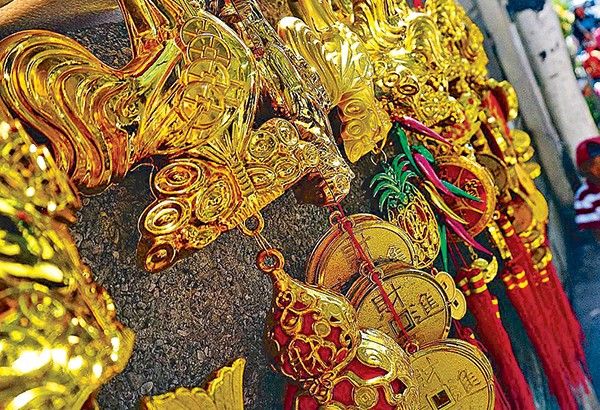Do you believe in luck?


My three sisters and I grew up with no lucky charms, superstitions or Feng Shui in the house. Dad thought his “cuatro Marias” were his greatest gifts, and his wife Sonia, his one and only “lucky charm,” if ever there was such.
During my formative years, my family lived in Iloilo City, which was bathed in simple but classy provincial charm. Until we moved to the big city and got exposed to more sophisticated friends and more media, we never really heard of the practice of having 12 pieces of 12 round fruits on New Year’s Eve (traditional and Chinese); had no qualms about turning fish around even when someone in the family was about to travel; thought pagpag was simply dusting off lint from one’s clothes. Mom used to dress my sister Mary Mae (our second names even rhymed!) and me in identical clothes, but we don’t remember wearing identical polka-dotted outfits on New Year’s Eve.
But I do remember Dad always thought that “13” was his lucky number. He was born on July 13, and my sister Geraldine was born on July 13, 34 years later. Dad also got a handsome job offer, which was to be the biggest break of his life, on the 13th day of one month that he didn’t expect to change his life.
Other than that, Dad’s mantra was to work hard for one’s pot of gold. He bought Sweepstakes tickets but never thought his life’s happiness depended on them.
***
Perhaps, because most of the wealthy people in our midst are Filipino-Chinese (of the Top 5 richest men in the Philippines, four are Filipino-Chinese: 1. Henry Sy - $13.7 billion; 2. John Gokongwei Jr. - $6.8 billion; 4. Lucio Tan - $4.9 billion; and 5. George Ty - $4.6 billion), many of us look to the Chinese for tips on how to be rich. We examine their practices, most of which are heavily rooted in Feng Shui, and try them out ourselves. Why not, if we have nothing to lose but a few hundreds for more pineapples (said to be lucky because they have several “eyes”) on New Year’s Eve? We have tikoy even if it is greasy, calorie-laden and pasty because it is said to augur well for family togetherness.
I had lunch once with an elegant Chinese lady dubbed the “Mother Superior” of her group of socialites. I was seated to her right and for every dish of the lauriat we partook of, she served me first. “Suwerte daw ito,” the lady, who lives in a tony mansion in Forbes Park, whispered to me.
I tried to emulate her solicitousness in the subsequent lauriat I attended and explained in a conspiratorial whisper to my seatmate, “Suwerte daw ito…”
My seatmate gave me a funny look and riposted, “But good manners always reap benefits!”
Oo, nga naman. It pays to be courteous to one’s seatmate!
My husband Ed also told me that a taipan once commissioned a study on certain superstitions. One study wanted to unravel why it was thought to be “bad luck” to build one’s home on a tumbok (the end of a road that forks). The study revealed the practice had its origins during times when horse-drawn carriages ruled the road, and thus when one’s house was on a tumbok, it was prone to being hit by horses and carriages. Makes sense, too.
I once interviewed the owners of the phenomenal bakeshop chain Conti’s, and they revealed to me that their first store was on a tumbok in BF Homes Parañaque. Yes, they were warned of the superstition attached to it. They also were warned that some potential customers might think Conti’s meant the restaurant’s servings would be konti (meager). Yet the God-fearing Conti sisters, armed with prized recipes, talent and hard work, turned the store into their lucky charm, a golden goose that still lays golden eggs till today. Incidentally, the store remains on its original tumbok.
Luck walked up to my sister Mary Mae in Anaheim, California one day in the form of a lost dog. The dog followed her to her office and Mae gave it food and drink. After work, she found the dog still by her car, waiting for her. My sister brought the dog to the vet to be cleaned up and to have its shots. She then reported to the authorities that she had found a lost dog. Years have passed and no one has claimed the dog. It is now the sunshine of Mae’s life, giving her lots of joy and yes, a string of lucky breaks. She named the dog, “Lucky.”
***
I asked some of my friends of Chinese descent if they believe in luck.
Cosmetic surgeon Dr. Z Teo, a visionary who, together with wife Dr. Aivee Aguilar-Teo, has established clinics with the most sought-after services, says, “I personally don’t completely believe in pure luck. I believe that one has to seize the most of the opportunities that come one’s way. For opportunities to come, we should work hard and be passionate in what we do.”
“Also to remember to listen to God’s guidance and leading so that we can be directed to make the right decisions,” adds Z, a proud father of three who is one of PeopleAsia’s “People of the Year” for 2017.
Young taipan Karl Chusuey, vice president for marketing of Henann Group of Resorts, the biggest and fastest growing resort chain in the Philippines, believes “in creating my own luck. But believing in plain luck is rather silly, don’t you think?”
Or believing in “plain bad luck,” or malas, is silly as well.
I remember the cover of PeopleAsia magazine where Karl posed with his father Dr. Henry Chusuey and older brother Alfonso — a handsome troika to be sure, ignoring or unmindful of the superstition that it was “bad luck” to pose in groups of three! (I know of one lovable icon who refuses to be photographed when there are only three people in the frame.)
Three-time Katha awardee Ann Ong surmounted many odds, including personal hurdles, to be the internationally renowned jewelry designer she is now. And she believes in luck.
“Yes, I believe in luck. It’s a person’s destiny in this universe,” Ann declares.
Linda Ley, the beauteous Gong Li look-alike who seems to have been first in line when God was giving away looks and charm, agrees: “Yes, of course, I believe in luck! But we cannot solely rely on luck. Effort + luck = Success.”
So whether you believe in luck or making one’s own luck — through hard work or certain practices or a combination of both — is your destiny. Make your own equation for success.
A Tsinoy colleague once told me that Chinese families don’t serve chicken during the Chinese New Year feast lest they end up “isang kahig, isang tuka” (“kahig” means scratching off the soil’s surface and “tuka” means pecking just what lies beneath). It’s good to know that in this Year of the Rooster, a lot of chickens will be getting a reprieve on Chinese New Year’s Eve.
Happy Year of the Rooster, everyone! * (You may e-mail me at [email protected].)
- Latest
























